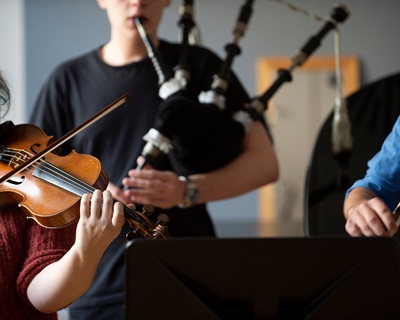Research supports and extends the link between playing a musical instrument in childhood and change in cognitive ability between age 11 and 70
A new study shows that lifetime experience of playing a musical instrument is linked with slightly higher performance levels on tests of processing speed and visuospatial reasoning at ages 70, 73, 76, 79 and 82, even after taking into consideration factors such as health status, years of education and childhood cognitive ability.
While all participants’ test performance tended to decline during ageing, those with greater experience of playing a musical instrument showed sustained, slightly higher performance on particular cognitive tests.
The study was a collaboration between researchers at Edinburgh Napier University and the University of Edinburgh.
Dr Judith Okely, Edinburgh Napier University said: “We see these results as an exciting starting point for further investigation into how musical experience from across the life course might contribute to healthy ageing.”
Prof. Katie Overy, University of Edinburgh, said: “Music can be such a joyful and enriching experience at all ages, regardless of expertise or musical genre.
“We are keen to investigate musical experience further, including music listening and singing, and we look forward to developing the new volunteer database”
420 participants completed a series of assessments testing their speed of processing, visuospatial reasoning, verbal ability and verbal memory, as well as a questionnaire which asked them about different kinds of musical experience.
Of the 420 participants, 167 had some experience of playing a musical instrument – mostly during childhood and adolescence.
The team used statistical models to explore associations between experience of playing a musical instrument and performance on the various cognitive tests, between the ages of 70 and 82.
The researchers found that experience playing a musical instrument had a small but detectable association with better performance on tests of processing speed and visuospatial reasoning - even when accounting for years of education, socio-economic status, general cognitive ability at age 11, and health variables in older age.
The researchers caution that the results do not prove that musical training enhances cognitive skills, since unexplored factors might have contributed to the findings, such as other enriching childhood experiences. Nevertheless, the findings clearly identify playing a musical instrument as a candidate activity that might contribute to staying sharper in later life - a result that can be explored in future studies.
Study participants were part of the Lothian Birth Cohort 1936 – a group of individuals from the Edinburgh and Lothian areas, born in 1936, who took part in the Scottish Mental Survey of 1947.
The individuals have been tested on a number of physical and mental functions as they grow older, including regular resitting of standardised cognitive ability tests.
The study, funded by Age UK and the Economic and Social Research Council, is published in the journal Psychology and Aging and was a collaboration between researchers in Psychology and Music.
Call for Volunteers
The researchers are planning further studies exploring other aspects of ageing such as wellbeing, and they would like to hear from people with a wide range of musical experiences, including informal music listening, singing, dancing, performing and/or teaching.
Anyone over 18 can volunteer to join a new database to contribute to future studies. The researchers are currently particularly interested in hearing from people in retirement.
To sign up to the new Music Research Volunteer Database, please click here: https://napier-music.sona-systems.com.